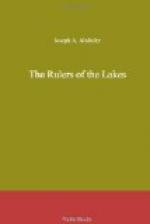“I don’t believe the world can show its superior, Tayoga,” replied Robert, “and I, like you, am full of pride, because we are lords of it for a day. I hope the time will soon come when we shall be permanent rulers of both lakes, Andiatarocte and Oneadatote.”
“We shall have to be mighty warriors before that hour arrives,” said Tayoga, gravely. “Even if we gain Andiatarocte we have yet to secure a footing on the shores of Oneadatote. The French and their allies are not only in great force at Crown Point, but we hear that they mean to fortify also at the place called Ticonderoga by the Hodenosaunee and Carillon by the French.”
The order to resume the march came, and they pressed forward on the trail through the deep woods. Usually at this time of the year it was hot in the forest, but after the great storm and rain of the night before a brisk, cool wind moved in waves among the trees, shaking the leaves and sending lingering raindrops down on the heads of the pursuers.
Black Rifle curved off to the right as a flanker against ambush, and two of Daganoweda’s best scouts were sent to the left, while the main force went on directly, feeling now that the danger from a hidden force had been diminished greatly, their zeal increasing as the trail grew warmer. Daganoweda believed that they could overtake St. Luc in three or four hours, and he and his Mohawks, flushed with victory on the lake, were now all for speed, the rangers being scarcely less eager.
The country through which they were passing was wooded heavily, wild, picturesque and full of game. But it was well known to Mohawks and rangers, and the two lads had also been through it. They started up many deer that fled through the forest, and the small streams and ponds were covered with wild fowl.
“I don’t wonder that the settlers fail to come in here on this strip of land between George and Champlain,” said Robert to Tayoga. “It’s a No Man’s land, roamed over only by warriors, and even the most daring frontiersman must have some regard for the scalp on his head.”
“I could wish it to be kept a No Man’s land,” said Tayoga earnestly.
“Maybe it will—for a long time, anyway. But, Tayoga, you’re as good a trailer as Black Rifle or any Mohawk. Judging from the traces they leave, how many men would you say St. Luc now has with him?”
“As many as we have, or more, perhaps seventy, though their quality is not as good. The great footprint in the center of the trail is made by Tandakora. He, at least, has not fallen, and the prints that turn out are those of St. Luc, De Courcelles and doubtless of the officer Jumonville. The French leaders walked together, and here they stopped and talked a minute or two. St. Luc was troubled, and it was hard for him to make up his mind what to do.”
“How do you know that, Tayoga?”
“Because, as he stood by the side of this bush, he broke three of its little stems between his thumb and forefinger. See, here are the stumps. A man like St. Luc would not have had a nervous hand if he had not been perplexed greatly.”




